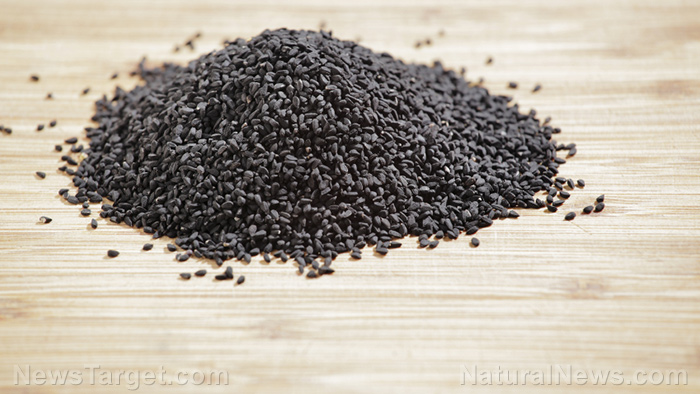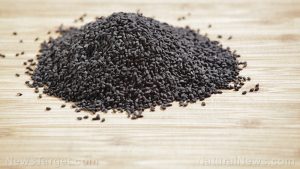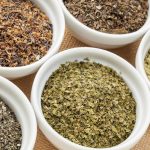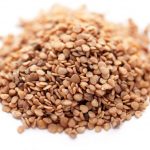
Cumin – sources, health benefits, nutrients, uses and constituents at NaturalPedia.com
Friday, June 30, 2017 by Tim Wesley
http://www.naturalnewsherbs.com/2017-06-30-cumin-sources-health-benefits-nutrients-uses-and-constituents-at-naturalpedia-com.html

Nutty, spicy, and delicious, cumin is a popular spice made from the seeds of the Cuminum cyminum plant. It is widely used in Mediterranean and Southwest Asian dishes. Cumin has a very distinct flavor that makes it great for curries, tamales, and other flavorful dishes. Its small seeds possess a nutty flavor and pack a lot of nutritional benefits.

List of known nutrients
- Calcium
- Choline
- Copper
- Fiber
- Folate
- Iron
- Magnesium
- Manganese
- Niacin
- Phosphorus
- Potassium
- Protein
- Selenium
- Sodium
- Vitamin A
- Vitamin B1
- Vitamin C
- Vitamin E
- Vitamin K
- Zinc
Medicinal uses for cumin
The most common use for this spice is treating indigestion by increasing digestive enzymes to speed up the movement of food throughout the body. It can also produce more bile, a fluid released by the liver, to facilitate the proper digestion of fats.
Concentrate cumin has been found to have positive effects on health. One study that involves 57 patients showed that taking concentrated cumin helps improve irritable bowel syndrome. At the same, time concentrated cumin has the potential to fight diabetes.
Although there are some slightly contradicting studies about cumin’s effects on heart health, some prove its positive effects on lowering unhealthy blood triglycerides and bad low density lipo-protein (LDL) cholesterol after consuming cumin extract. One particular study that involved 88 women showed that participants gained higher good high-density lipoprotein (HDL) cholesterol after including cumin in their yogurt for three months.
It’s nice to know that cumin does more than spice up your favorite dishes: its antimicrobial properties make cumin a very good tool in promoting food safety. Cumin reduces the risk of getting ill due to food-borne infections.
The caffeine and essential oils present in cumin create a potent and ideal cure for those who have respiratory problems like bronchitis and asthma. Cumin can serve as an effective expectorant.
This spice is rich in iron. In fact, cumin contains more than five times of an adult’s daily iron requirement. Its iron content helps make oxygen transfer more efficient, making cumin a really good weapon against anemia. It promotes efficient blood circulation that also leads to increased cognitive performance. At the same time, it prevents disorders like Alzheimer’s and dementia.
Because cumin contains antifungal and disinfectant properties, you can use it when treating skin problems. Cumin prevents skin infections. Aside from that, the vitamin E found in cumin helps prevent premature signs of aging (sun spots, wrinkles, and sagging skin) and maintains healthy-looking skin. Additionally, cumin helps treat boils. Those who regularly consume cumin were found to have a lower incidence of rashes and pimples. Last but definitely not the least, cumin can prevent cancer. Studies have shown that its detoxifying and chemopreventive properties can prevent colon cancer.
Body systems supported by cumin
Cumin is beneficial to your overall health. It does the following: improves digestion, addresses respiratory problems, serves as an effective laxative, treats insect bites and renal coli, improves weak memory, maintains healthy skin, prevents premature aging, improves cognitive performance, alleviates fatigue, relieves stress, helps flush out toxins from the body, cures insomnia, helps improve metabolism, promotes weight loss, removes strain on the liver and the pancreas, boosts the body’s defense system, and fights viral infections.
Ways to use cumin
As a widely used spice, cumin clearly can fit with any recipe and satisfy even the pickiest taste buds. You can use it in soups, salads, salsas, sauces, dips, and other savory dishes. Here’s a list of delicious cumin recipes you can do at home.
Where to learn more
- Cumin improves digestion, relieves stress, and protects against stomach cancer!
- 1 Daily Teaspoon of Cumin Could Help You Lose 3 Times As Much Body Fat
- A Simple Method to Lose 20 Pounds In A Month With the Help of Cumin
- Protect yourself from flu season with these natural cold remedies
- Top health benefits of cumin
Summary
Cumin can promote healthy-looking skin.
Cumin can prevent colon cancer.
Cumin helps boost the body’s defense against illnesses.
Cumin promotes healthy digestion.
Cumin protects the heart by lowering blood pressure and regulating cholesterol levels.
Cumin can prevent diabetes.
Cumin provides energy boost.
Cumin can improve cognitive performance.
Sources include:
Tagged Under: Tags: Cumin





